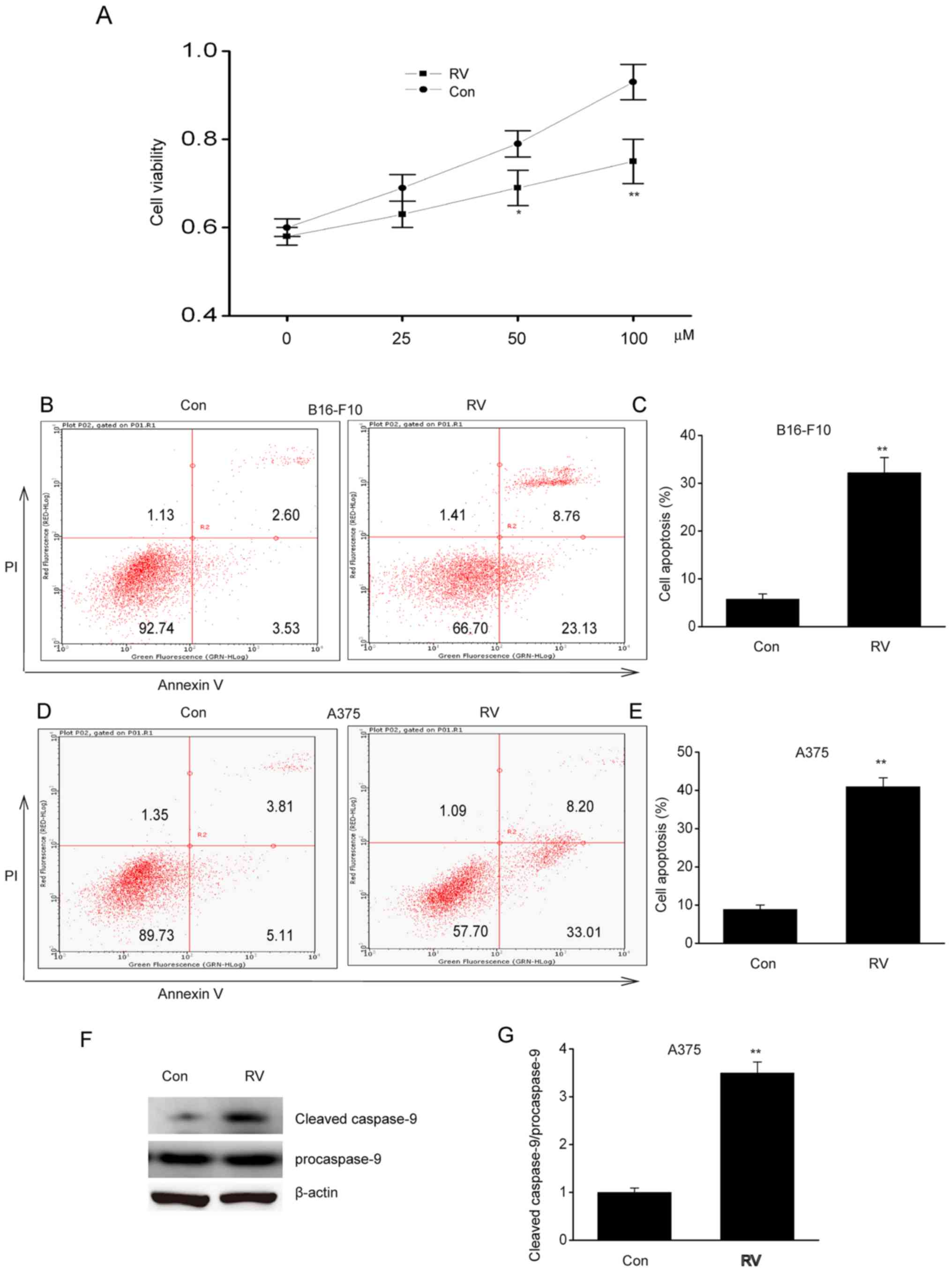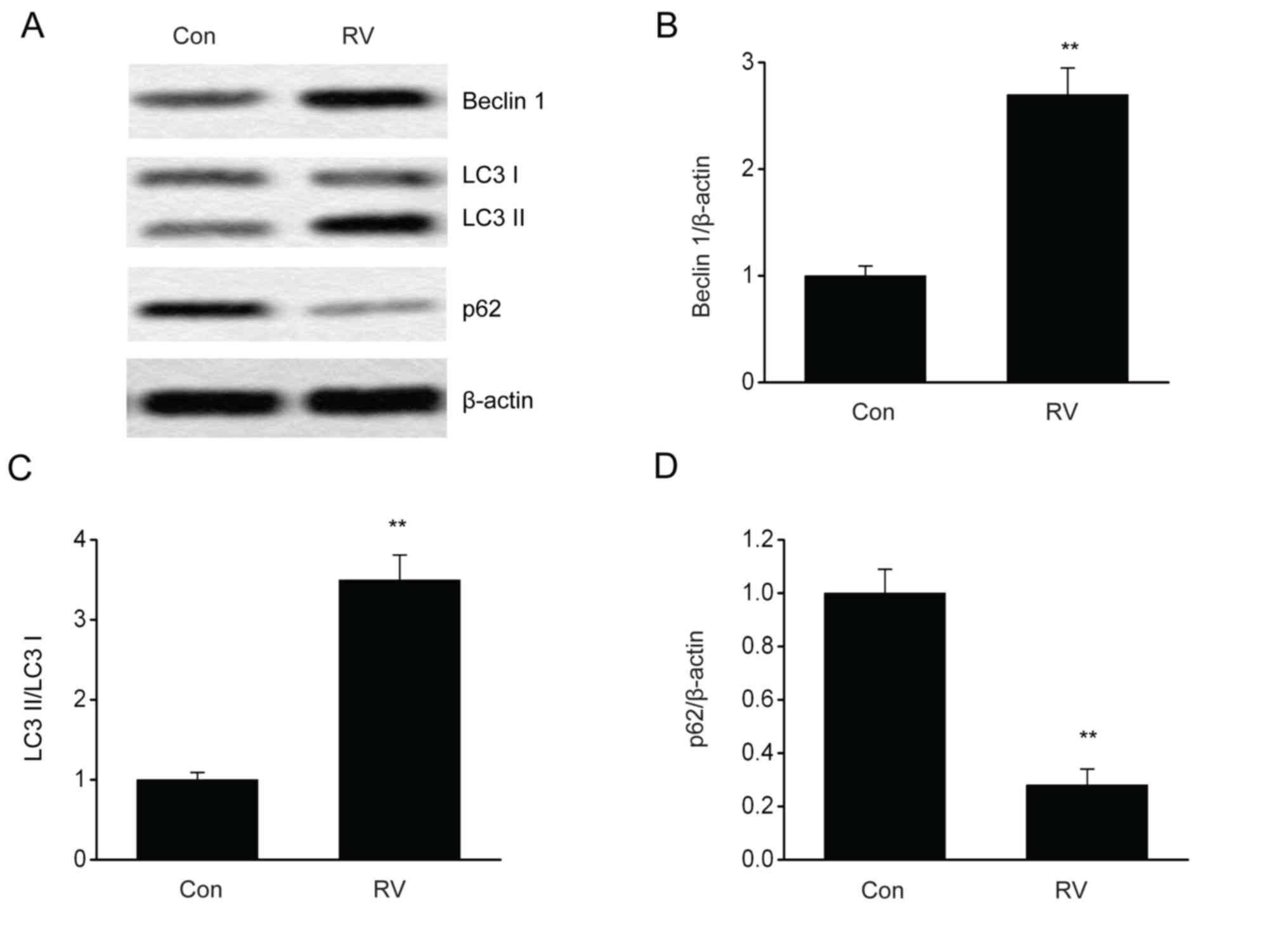|
1
|
Falletta P, Sanchez-Del-Campo L, Chauhan
J, Effern M, Kenyon A, Kershaw CJ, Siddaway R, Lisle R, Freter R,
Daniels MJ, et al: Translation reprogramming is an evolutionarily
conserved driver of phenotypic plasticity and therapeutic
resistance in melanoma. Genes Dev. 31:18–33. 2017. View Article : Google Scholar : PubMed/NCBI
|
|
2
|
Jha S, Morris EJ, Hruza A, Mansueto MS,
Schroeder GK, Arbanas J, McMasters D, Restaino CR, Dayananth P,
Black S, et al: Dissecting therapeutic resistance to ERK
inhibition. Mol Cancer Ther. 15:548–559. 2016. View Article : Google Scholar : PubMed/NCBI
|
|
3
|
Rastrelli M, Tropea S, Rossi CR and
Alaibac M: Melanoma: Epidemiology, risk factors, pathogenesis,
diagnosis and classification. In Vivo. 28:1005–1011.
2014.PubMed/NCBI
|
|
4
|
Boyle GM: Therapy for metastatic melanoma:
An overview and update. Expert Rev Anticancer Ther. 11:725–737.
2011. View Article : Google Scholar : PubMed/NCBI
|
|
5
|
Oz B, Yildirim A, Yolbas S, Celik ZB, Etem
EO, Deniz G, Akin M, Akar ZA, Karatas A and Koca SS: Resveratrol
inhibits Src tyrosine kinase, STAT3, and Wnt signaling pathway in
collagen induced arthritis model. Biofactors. 45:69–74. 2019.
View Article : Google Scholar : PubMed/NCBI
|
|
6
|
Suh J, Kim DH and Surh YJ: Resveratrol
suppresses migration, invasion and stemness of human breast cancer
cells by interfering with tumor-stromal cross-talk. Arch Biochem
Biophys. 643:62–71. 2018. View Article : Google Scholar : PubMed/NCBI
|
|
7
|
Jhaveri A, Luther E and Torchilin V: The
effect of transferrin-targeted, resveratrol-loaded liposomes on
neurosphere cultures of glioblastoma: Implications for targeting
tumour-initiating cells. J Drug Target. 27:601–613. 2019.
View Article : Google Scholar : PubMed/NCBI
|
|
8
|
Zadi Heydarabad M, Nikasa M, Vatanmakanian
M, Azimi A and Farshdousti Hagh M: Regulatory effect of resveratrol
and prednisolone on MDR1 gene expression in acute lymphoblastic
leukemia cell line (CCRF-CEM): An epigenetic perspective. J Cell
Biochem. 119:4890–4896. 2018. View Article : Google Scholar : PubMed/NCBI
|
|
9
|
Fröjdö S, Cozzone D, Vidal H and Pirola L:
Resveratrol is a class IA phosphoinositide 3-kinase inhibitor.
Biochem J. 406:511–518. 2007. View Article : Google Scholar : PubMed/NCBI
|
|
10
|
Gwak H, Haegeman G, Tsang BK and Song YS:
Cancer-specific interruption of glucose metabolism by resveratrol
is mediated through inhibition of Akt/GLUT1 axis in ovarian cancer
cells. Mol Carcinog. 54:1529–1540. 2015. View Article : Google Scholar : PubMed/NCBI
|
|
11
|
Trincheri NF, Follo C, Nicotra G,
Peracchio C, Castino R and Isidoro C: Resveratrol-induced apoptosis
depends on the lipid kinase activity of Vps34 and on the formation
of autophagolysosomes. Carcinogenesis. 29:381–389. 2008. View Article : Google Scholar : PubMed/NCBI
|
|
12
|
Venkatadri R, Muni T, Iyer AK, Yakisich JS
and Azad N: Role of apoptosis-related miRNAs in resveratrol-induced
breast cancer cell death. Cell Death Dis. 7:e21042016. View Article : Google Scholar : PubMed/NCBI
|
|
13
|
Yang J, Chen Q, Tian S, Song S, Liu F,
Wang Q and Fu Z: The role of 1,25-dyhydroxyvitamin D3 in mouse
liver ischemia reperfusion injury: Regulation of autophagy through
activation of MEK/ERK signaling and PTEN/PI3K/Akt/mTORC1 signaling.
Am J Transl Res. 7:2630–2645. 2015.PubMed/NCBI
|
|
14
|
Pi H, Li M, Zou L, Yang M, Deng P, Fan T,
Liu M, Tian L, Tu M, Xie J, et al: AKT inhibition-mediated
dephosphorylation of TFE3 promotes overactive autophagy independent
of MTORC1 in cadmium-exposed bone mesenchymal stem cells.
Autophagy. 15:565–582. 2019. View Article : Google Scholar : PubMed/NCBI
|
|
15
|
Su Y, Lu J, Gong P, Chen X, Liang C and
Zhang J: Rapamycin induces autophagy to alleviate acute kidney
injury following cerebral ischemia and reperfusion via the
mTORC1/ATG13/ULK1 signaling pathway. Mol Med Rep. 18:5445–5454.
2018.PubMed/NCBI
|
|
16
|
Grandèr D and Panaretakis T: Autophagy:
Cancer therapy's friend or foe? Future Med Chem. 2:285–297. 2010.
View Article : Google Scholar : PubMed/NCBI
|
|
17
|
Livesey KM, Tang D, Zeh HJ and Lotze MT:
Not just nuclear proteins: ‘Novel’ autophagy cancer treatment
targets-p53 and HMGB1. Curr Opin Investig Drugs. 9:1259–1263.
2008.PubMed/NCBI
|
|
18
|
Pavlides S, Vera I, Gandara R, Sneddon S,
Pestell RG, Mercier I, Martinez-Outschoorn UE, Whitaker-Menezes D,
Howell A, Sotgia F and Lisanti MP: Warburg meets autophagy:
Cancer-associated fibroblasts accelerate tumor growth and
metastasis via oxidative stress, mitophagy, and aerobic glycolysis.
Antioxid Redox Signal. 16:1264–1284. 2012. View Article : Google Scholar : PubMed/NCBI
|
|
19
|
Verykiou S, Alexander M, Edwards N,
Plummer R, Chaudhry B, Lovat PE and Hill DS: Harnessing autophagy
to overcome mitogen-activated protein kinase kinase
inhibitor-induced resistance in metastatic melanoma. Br J Dermatol.
180:346–356. 2019. View Article : Google Scholar : PubMed/NCBI
|
|
20
|
Tan RH, Wang F, Fan CL, Zhang XH, Zhao JS,
Zhang JJ, Yang Y, Xi Y, Zou ZQ and Bu SZ: Algal oil rich in n-3
polyunsaturated fatty acids suppresses B16F10 melanoma lung
metastasis by autophagy induction. Food Funct. 9:6179–6186. 2018.
View Article : Google Scholar : PubMed/NCBI
|
|
21
|
Wu X, Yu J, Yan J, Dai J, Si L, Chi Z,
Sheng X, Cui C, Ma M, Tang H, et al: PI3K/AKT/mTOR pathway
inhibitors inhibit the growth of melanoma cells with mTOR H2189Y
mutations in vitro. Cancer Biol Ther. 19:584–589. 2018. View Article : Google Scholar : PubMed/NCBI
|
|
22
|
Wang H, Peng Y, Wang J, Gu A, Li Q, Mao D
and Guo L: Effect of autophagy on the resveratrol-induced apoptosis
of ovarian cancer SKOV3 cells. J Cell Biochem. Nov 18–2018.(Epub
ahead of print).
|
|
23
|
Liu D, He B, Lin L, Malhotra A and Yuan N:
Potential of curcumin and resveratrol as biochemical and
biophysical modulators during lung cancer in rats. Drug Chem
Toxicol. 42:328–334. 2019. View Article : Google Scholar : PubMed/NCBI
|
|
24
|
Li D, Wang G, Jin G, Yao K, Zhao Z, Bie L,
Guo Y, Li N, Deng W, Chen X, et al: Resveratrol suppresses colon
cancer growth by targeting the AKT/STAT3 signaling pathway. Int J
Mol Med. 43:630–640. 2019.PubMed/NCBI
|
|
25
|
Lei MJ, Dong Y, Sun CX and Zhang XH:
Resveratrol inhibits proliferation, promotes differentiation and
melanogenesis in HT-144 melanoma cells through inhibition of
MEK/ERK kinase pathway. Microb Pathog. 111:410–413. 2017.
View Article : Google Scholar : PubMed/NCBI
|
|
26
|
Kim SE, Shin SH, Lee JY, Kim CH, Chung IK,
Kang HM, Park HR, Park BS and Kim IR: Resveratrol induces
mitochondrial apoptosis and inhibits epithelial-mesenchymal
transition in oral squamous cell carcinoma cells. Nutr Cancer.
70:125–135. 2018. View Article : Google Scholar : PubMed/NCBI
|
|
27
|
Wright C, Iyer AKV, Yakisich JS and Azad
N: Anti-tumorigenic effects of resveratrol in lung cancer cells
through modulation of c-FLIP. Curr Cancer Drug Targets. 17:669–680.
2017. View Article : Google Scholar : PubMed/NCBI
|
|
28
|
Nazim UM and Park SY: Attenuation of
autophagy flux by 6-shogaol sensitizes human liver cancer cells to
TRAIL-induced apoptosis via p53 and ROS. Int J Mol Med. 43:701–708.
2019.PubMed/NCBI
|
|
29
|
Zhou GZ, Shi YY, Wei LL and Sun GC:
Autophagy induction and antiproliferative effect of a novel
curcumin derivative MOMI-1 on the human lung cancer cells A549. J
Biochem Mol Toxicol. 33:e222802019. View Article : Google Scholar : PubMed/NCBI
|
|
30
|
Nguyen TD, Shaid S, Vakhrusheva O,
Koschade SE, Klann K, Thölken M, Baker F, Zhang J, Oellerich T,
Sürün D, et al: Loss of the selective autophagy receptor p62
impairs murine myeloid leukemia progression and mitophagy. Blood.
133:168–179. 2019. View Article : Google Scholar : PubMed/NCBI
|
|
31
|
Ge D, Gao J, Han L, Li Y, Liu HH, Yang WC,
Chang F, Liu J, Yu M and Zhao J: Novel effects of
sphingosylphosphorylcholine on the apoptosis of breast cancer via
autophagy/AKT/p38 and JNK signaling. J Cell Physiol.
234:11451–11462. 2019. View Article : Google Scholar : PubMed/NCBI
|
|
32
|
Cordani M and Somoza Á: Targeting
autophagy using metallic nanoparticles: A promising strategy for
cancer treatment. Cell Mol Life Sci. 76:1215–1242. 2019. View Article : Google Scholar : PubMed/NCBI
|
|
33
|
Koustas E, Sarantis P, Papavassiliou AG
and Karamouzis MV: Upgraded role of autophagy in colorectal
carcinomas. World J Gastrointest Oncol. 10:367–369. 2018.
View Article : Google Scholar : PubMed/NCBI
|
|
34
|
Li WD, Li NP, Song DD, Rong JJ, Qian AM
and Li XQ: Metformin inhibits endothelial progenitor cell migration
by decreasing matrix metalloproteinases, MMP-2 and MMP-9, via the
AMPK/mTOR/autophagy pathway. Int J Mol Med. 39:1262–1268. 2017.
View Article : Google Scholar : PubMed/NCBI
|
|
35
|
Zhang N, Zhang J, Tan YQ, Du GF, Lu R and
Zhou G: Activated Akt/mTOR-autophagy in local T cells of oral
lichen planus. Int Immunopharmacol. 48:84–90. 2017. View Article : Google Scholar : PubMed/NCBI
|
|
36
|
Shi X, Yang L, Xie J, Zhao Y, Cong J, Li
Z, Li H, Cheng X and Fan J: UNBS5162 inhibits proliferation of
human melanoma cells by inducing apoptosis via the PI3K/Akt
pathway. Mol Med Rep. 18:3382–3388. 2018.PubMed/NCBI
|
|
37
|
Kumar D, Shankar S and Srivastava RK:
Rottlerin induces autophagy and apoptosis in prostate cancer stem
cells via PI3K/Akt/mTOR signaling pathway. Cancer Lett.
343:179–189. 2014. View Article : Google Scholar : PubMed/NCBI
|
|
38
|
Chiu HY, Tsay YG and Hung SC: Involvement
of mTOR-autophagy in the selection of primitive mesenchymal stem
cells in chitosan film 3-dimensional culture. Sci Rep. 7:101132017.
View Article : Google Scholar : PubMed/NCBI
|




















